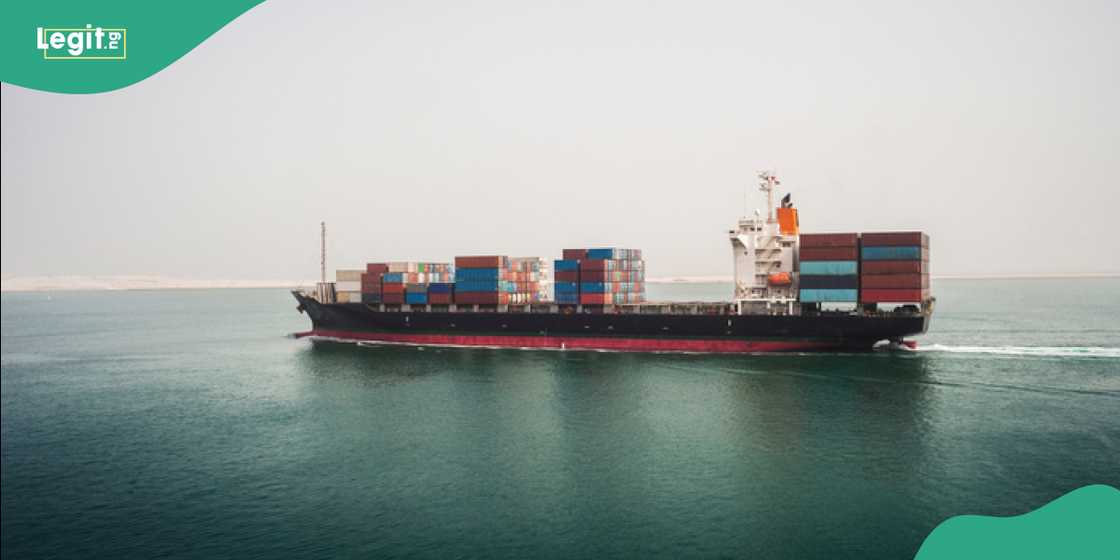Stakeholders Reveal High Rate UBA, Zenith, First Bank Give Loan to Ship Owners, Other Businesses
- Stakeholders in the maritime industry said several factors are preventing the nation from purchasing ships
- They include a short loan period, hefty interest rates, and banks' perception of risk, among other factors
- They talked about how the difficulty of Nigerian banks to finance ship purchases because of informational gaps
Legit.ng journalist Zainab Iwayemi has over 3-year-experience covering the Economy, Technology, and Capital Market.
Maritime industry stakeholders have said that short loan terms, high interest rates, and banks' perception of risk impede the country's ability to acquire ships.

Source: UGC
They also clarified the detrimental effects on the marine industry caused by fluctuating foreign exchange rates, a dearth of knowledge about ship finance, bureaucratic roadblocks, corruption, and restricted access to overseas capital.
They discussed how the inability of Nigerian banks to provide loans due to a lack of information was impeding the purchase of ships and other vital assets in the maritime sector at the quarterly conference of the Nigerian Association of Master Mariners (NAMM), with a theme of "Cabotage Financing."
The Cabotage Act, according to Captain Emmanuel Iheanacho, a former minister of interior, was passed to solve issues like limiting coastal trade to ships flying the Nigerian flag and impsing regulations on vessel ownership, crewing, and management.
Iheanacho clarified that the country's shipping industry had not developed due to the high loan rates that Nigerian banks had been charging.
Interest on loans
During his paper presentation at the event, he pointed out that banks in the nation lacked the necessary tools to provide loans similar to those in other nations, where banks charge ship owners as low as 4%.
The former minister gave an explanation of some of the major commercial banks in Nigeria that provide ship acquisition loans; citing Zenith Bank as one that charges between 10 and 15 percent annually, GT Bank as another that charges between nine and 14 percent annually, with First Bank and UBA between 10 and 16 percent.
Iheanacho added that it was hard for indigenous ship owners to buy vessels and remain competitive under the Coastal and Inland Shipping (Cabotage) Act 2003 because of the exorbitant borrowing rates that the banks were charging.
He said,
“The desire to participate in all aspects of shipping operations and international shipping is crucial and this takes us to the buying of cabotage ships.”
“However, there are other areas that we refer to as cabotage but they are not. They are coastal vessels, supply vessels and off- shore vessels on Nigerian waters. We have worked in Nigerian companies and participated in indigenous trade; so, there is a need to enhance our capacity for owning and operating ships.
“This campaign should be maintained and taken to the level of participating in international shipping. However, we need to buy vessels depending on the trade involved and this takes us to the opportunities available for funding shipping provided by the government.”

Read also
Expert speaks on CBN’s decision to raise interest rate by 50 basis points, asks important questions
Furthermore, Captain Tajudeen Alao, the President of NAMM in a New Teleghaph report, urged the Nigerian Maritime Administration and Safety Agency (NIMASA) to stop keeping the three percent levy it collected from cabotage operations.
He claimed that two of the three percent levy were intended to be deposited into the Cabotage Vessel Financial Fund (CVFF) account for the advancement of shipping, but they had not been put to that use.
Speaking to the new interest rate, Fidelis Obaniyi, an economist told Legit.ng that high interest rate aims to have a tighter monetary stance. He said, however, that the effectiveness of this also depends on the fiscal measure as the sidekick.
“However, that could also trigger higher default rates because borrowers may also struggle to meet payment requirements, leading to increase in non-performing loans.”
Nigeria customs announces new dollar exchange rate
Legit.ng reported that the exchange rates for cargo clearance at the country's seaports and airports have once again been increased by the Central Bank of Nigeria (CBN).
The Nigerian Customs Service (NCS) official trade portal states that as of Monday, July 9, 2024, the Customs dollar rate was raised by the CBN to N1,524.37.
The new rate is 0.80%, or N12.16, more than the previous rate of N1,512.21 on Sunday, July 8, 2024.
PAY ATTENTION: Donate to Legit Charity on Patreon. Your support matters!
Source: Legit.ng




